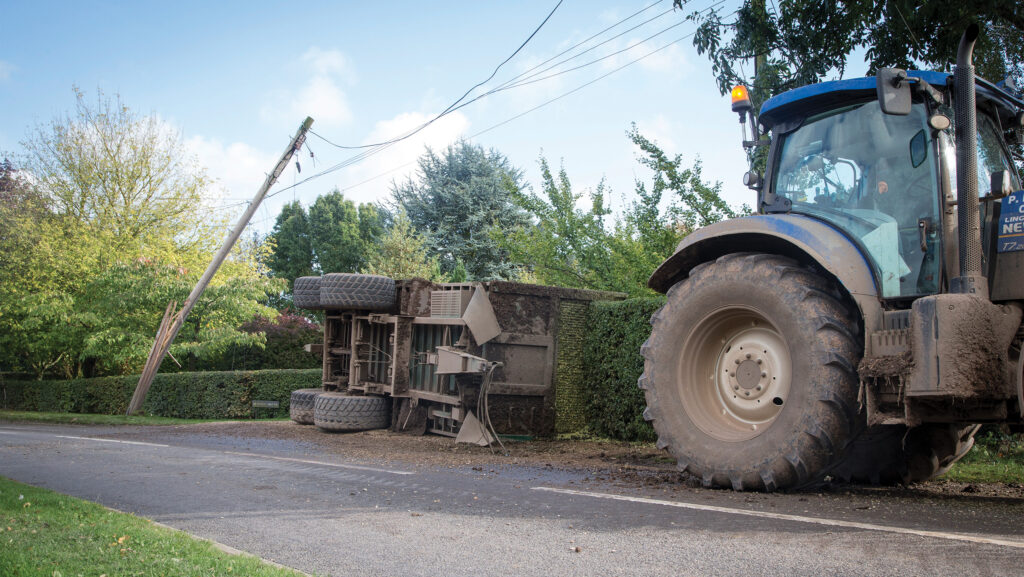Legal expenses insurance: What farmers should know
 Trailer accident - overturned trailer on the public highway
Trailer accident - overturned trailer on the public highway Legal expenses cover is designed to insure against future legal costs and can be bought as a standalone product, although it is commonly available as an addition to combined farm policies.
Nigel Wellings, director of Acres Insurance Brokers, says that the terms and conditions are incredibly detailed.
However, a key thing that policyholders should be aware of is that many standard policies state any proposed legal action that a farmer might want to take must have a “reasonable prospect of success”.
See also: Advice on insurance implications for renewable energy projects
This is generally interpreted as meaning the policyholder must have a 51% or more chance of winning.
“This tends to be standard across legal expenses policies, as if they did not have this, they would waste so much time on hopeless cases,” says Nigel.
Use in defence of farmers
“However, the prospect of success clause only applies where the farmer is utilising the policy to take legal action against somebody.
“The most common use of these policies is for defending farmers against legal action taken against them, where the chance of success clause does not apply.”
The cost of standard legal expenses insurance (LEI), if added to a farm policy, is £70-£100 and will typically offer indemnity of between £100,000 and £250,000.
The cost of standalone products – the most popular being called Rural Protect, which brokers regard as the “Rolls-Royce” of legal expenses policies – is higher at £400-£450.
However, this type of policy provides wider coverage and the level of indemnity can go up to £5m.
David Murchie, head of agriculture at H&H Insurance Brokers, says not every farmer chooses to take out LEI, but there can be some significant advantages.
“One of the selling points of basic cover is that it offers protection against the professional costs of dealing with an HMRC investigation, including VAT disputes,” he says.
“Often people are paying their accountant for this separately. It is worth checking if you can get the same coverage through a combined policy which offers so much more than just tax protection.”
David says in addition to tax protection, LEI policies will typically cover employment disputes, compensation awards, data protection, property-related issues, contract disputes, and debt recovery.
One of the other advantages of Rural Protect is that in addition to paying for legal representation in the event of a Health & Safety Executive investigation, it will also cover the intervention fees that the HSE charges back to a farm.
This can be valuable given that the fees are currently £174/hour.
The most common use of all legal expenses policies is defending farmers against any legal action taken against them by bodies such as the HSE and Environment Agency.

© Adobe Stock
Insurers’ solicitors
Nigel says farmers should also be aware that the insurer will want to use their own solicitors when dealing with a claim, which some people may feel uncomfortable.
It is also the insurance company, rather than the claimant, with which will have the final say on whether the case has a reasonable chance of success.
“My experience of all of these schemes is that insurers will always appoint their own solicitors,” says Nigel.
“I have only ever seen them allow the appointment of the policyholder’s own solicitors in very specific circumstances and then they only pay prescribed rates per hour which are generally low and are described in the policy.”
Overall, both Nigel and David agree that LEI is worth having, but farmers should do their research about its limitations, be mindful there will be excesses to pay, and read the small print on any exclusions.
For example, a claim would only be successful for an employment dispute if the claimant can show they have followed the correct procedures in the first instance, says David.
“You can’t sack someone without following the correct procedure and then rely on your LEI to cover a claim. You need to be looking after your own business and following the law.
LEI should be viewed as an added safety net. It is there to be used but not to be abused.”
Legal assistance scheme
The NFU has a Legal Assistance Scheme (LAS) which is available to members if they pay a small fee on top of their membership.
It provides professional guidance, along with some financial support on a discretionary basis, to its subscribers facing legal disputes.
The LAS is not a legal expenses insurance product. However, the NFU can choose to make funding available where farmers cannot claim legal expenses insurance (LEI) for the relevant issue.
“The scheme will look to assist where the member has no LEI cover or their cover has been refused,” says Claire Christon, the NFU’s interim chief lawyer for LAS delivery.
“We will generally not cover matters where LEI is available, but we may on occasion cover a shortfall in any LEI funding.”
Where the dispute is between two members of the LAS scheme then it may provide financial support for mediation, should both parties be agreeable.
A similar approach is taken when dealing with a partnership dispute.
Farmers can also access telephone advice through the union’s CallFirst facility on 0370 845 8458.
